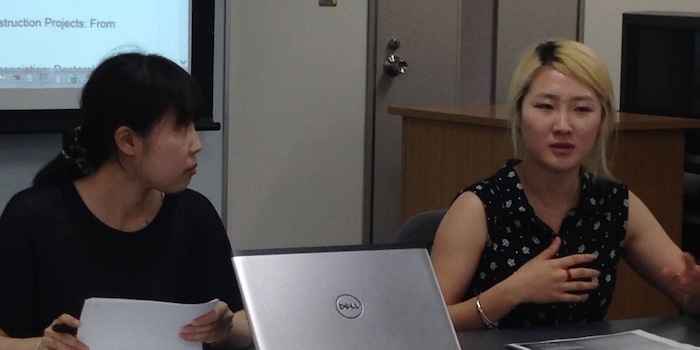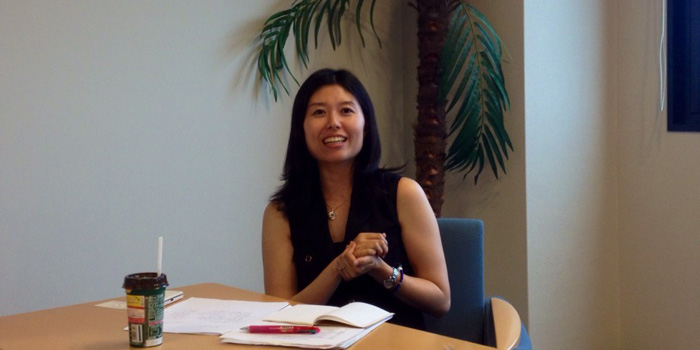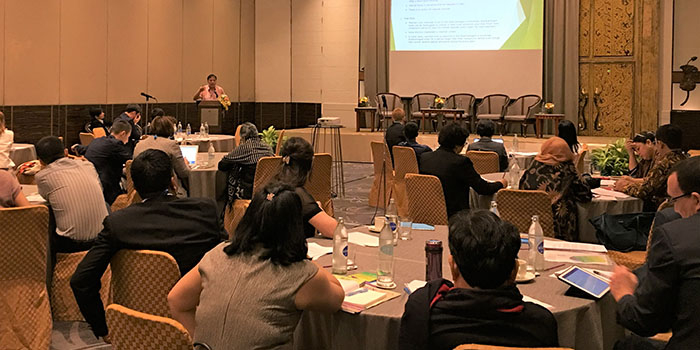 On Wednesday June 25th, 2014, a Development Management Policy Seminar on “International Education Cooperation in the Post-2015: From Perspectives of NGOs” was conducted in the simulation room in Kobe University’s Graduate School of International Cooperation Studies (GSICS). Two NGO workers on international education cooperation presented about their experience at this seminar. One of them was Ms. Soojung Crystal Park, a coordinator at the Education Without Borders (EWB). The other one was Ms. Mariko Taketani, a former project coordinator at the Japanese NGO, Shanti Volunteer Association (SVA) and currently a doctoral student at GSICS.
On Wednesday June 25th, 2014, a Development Management Policy Seminar on “International Education Cooperation in the Post-2015: From Perspectives of NGOs” was conducted in the simulation room in Kobe University’s Graduate School of International Cooperation Studies (GSICS). Two NGO workers on international education cooperation presented about their experience at this seminar. One of them was Ms. Soojung Crystal Park, a coordinator at the Education Without Borders (EWB). The other one was Ms. Mariko Taketani, a former project coordinator at the Japanese NGO, Shanti Volunteer Association (SVA) and currently a doctoral student at GSICS.
Ms. Park gave us a presentation on “International Education Cooperation Projects for Poverty Alleviation in Africa”. She talked about completed and ongoing projects in African countries by EWB. She first briefly introduced the vision and the main activities of EWB. Then, she explained about the Global Alliance for Poverty Alleviation (GAPA) project which has been conducting in Burkina Faso since 2010, showing the activities such as capacity building for ICT (Information and Communication Technologies). She also talked that EWB has been conducting projects together with local NGOs and international organizations. EWB is expecting that local people think by themselves and overcome poverty. According to her, EWB has also encouraged local people to participate in the project and this is related to sustainability of the project. At the end of the presentation, she showed us the future project in Ethiopia which tries to focus on Science, Mathematics and Technology (SMT) education. Toward the Post 2015, moreover, she mentioned that EWB would focus more on adult education and technical education.
 After Ms. Park’s presentation, Ms. Taketani presented about “International Education Cooperation through Library and School Construction Projects: From Experience of Japanese NGO” with her experience at SVA. She first explained about the history of SVA briefly and talked about library activities as one of the SVA’s main activities. According to her, library activities are conducting at all targeted countries. Secondly, she moved on to the next topic, education projects in Laos. She explained that since 1992 SVA Laos has conducted mobile library activities, publication, public library support and school construction project. Then, according to her, SVA Laos would start a new project which focus on minority children together with teacher training. At the end of her presentation, she explained about the SVA’s midterm plan which considers post-2015 and they would focus more on vulnerable people and work on governments to relate reading and library activities to education policies.
After Ms. Park’s presentation, Ms. Taketani presented about “International Education Cooperation through Library and School Construction Projects: From Experience of Japanese NGO” with her experience at SVA. She first explained about the history of SVA briefly and talked about library activities as one of the SVA’s main activities. According to her, library activities are conducting at all targeted countries. Secondly, she moved on to the next topic, education projects in Laos. She explained that since 1992 SVA Laos has conducted mobile library activities, publication, public library support and school construction project. Then, according to her, SVA Laos would start a new project which focus on minority children together with teacher training. At the end of her presentation, she explained about the SVA’s midterm plan which considers post-2015 and they would focus more on vulnerable people and work on governments to relate reading and library activities to education policies.
Two commentators of this seminar, Dr. Keiichi Ogawa and Dr. Ki-Seok “Korbil” Kim, Emeritus Professor at Seoul National University and as well as a Visiting Professor at GSICS, and Dr. Mark Ginsburg, Senior Policy Advisor, FHI360 as well as Visiting Scholar at University of Maryland provided their comments such as a source of revenue and plans for post-2015. Their comments and questions could deepen two presentations more. In a question and answer session, many participants gave two presenters various questions such as the way of selecting target people and the particular characteristics of Asian NGO.
This seminar was a great opportunity for all to share what kind of projects NGOs are implementing and how they are going to work on “Post 2015”.
By Mariko Taketani
Related Link:
http://www.kobe-u.ac.jp/en/NEWS/event/e2014_06_30_01.html
Related


 On Wednesday June 25th, 2014, a Development Management Policy Seminar on “International Education Cooperation in the Post-2015: From Perspectives of NGOs” was conducted in the simulation room in Kobe University’s Graduate School of International Cooperation Studies (GSICS). Two NGO workers on international education cooperation presented about their experience at this seminar. One of them was Ms. Soojung Crystal Park, a coordinator at the Education Without Borders (EWB). The other one was Ms. Mariko Taketani, a former project coordinator at the Japanese NGO, Shanti Volunteer Association (SVA) and currently a doctoral student at GSICS.
On Wednesday June 25th, 2014, a Development Management Policy Seminar on “International Education Cooperation in the Post-2015: From Perspectives of NGOs” was conducted in the simulation room in Kobe University’s Graduate School of International Cooperation Studies (GSICS). Two NGO workers on international education cooperation presented about their experience at this seminar. One of them was Ms. Soojung Crystal Park, a coordinator at the Education Without Borders (EWB). The other one was Ms. Mariko Taketani, a former project coordinator at the Japanese NGO, Shanti Volunteer Association (SVA) and currently a doctoral student at GSICS. After Ms. Park’s presentation, Ms. Taketani presented about “International Education Cooperation through Library and School Construction Projects: From Experience of Japanese NGO” with her experience at SVA. She first explained about the history of SVA briefly and talked about library activities as one of the SVA’s main activities. According to her, library activities are conducting at all targeted countries. Secondly, she moved on to the next topic, education projects in Laos. She explained that since 1992 SVA Laos has conducted mobile library activities, publication, public library support and school construction project. Then, according to her, SVA Laos would start a new project which focus on minority children together with teacher training. At the end of her presentation, she explained about the SVA’s midterm plan which considers post-2015 and they would focus more on vulnerable people and work on governments to relate reading and library activities to education policies.
After Ms. Park’s presentation, Ms. Taketani presented about “International Education Cooperation through Library and School Construction Projects: From Experience of Japanese NGO” with her experience at SVA. She first explained about the history of SVA briefly and talked about library activities as one of the SVA’s main activities. According to her, library activities are conducting at all targeted countries. Secondly, she moved on to the next topic, education projects in Laos. She explained that since 1992 SVA Laos has conducted mobile library activities, publication, public library support and school construction project. Then, according to her, SVA Laos would start a new project which focus on minority children together with teacher training. At the end of her presentation, she explained about the SVA’s midterm plan which considers post-2015 and they would focus more on vulnerable people and work on governments to relate reading and library activities to education policies.


